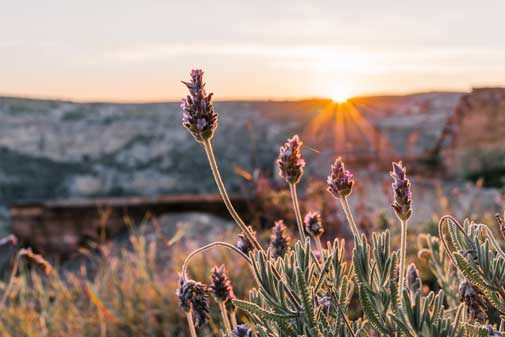The first thing you notice is the calming scent of lavender. It hangs faintly on the air everywhere, in the garden and in the house. That’s not surprising; the eco-lodge is named for the lavender that owners Elizabeth Perkins and Hans Groot grow on their farm amid a patchwork of rolling hills in Le Marche, between the mountains and the sea.
The fragrant plant stripes the hillside, giving them a raw material that they extract and distill into luscious bath products for guests of their eco-lodge. They also make cleansing agents and lavender and hydrosol which, says Elizabeth, is an effective disinfectant that also smells great.
The nearly four-acre farm is in a quiet spot close to the village of Carassai. “We liked the fact that Le Marche was relatively unknown and very green,” says Elizabeth. “Hans found the four-bedroom property in a ramshackle state but bought it with the idea of creating an agri-camping site and B&B.” Together, they worked to restore the land and the house.
Originally from New York, Elizabeth, 60, spent part of her childhood in Italy when her stepfather’s job took the family first to London and then to Rome. “Lucky me, I got to spend my middle school and high school years in Italy!” She returned to the U.S. as a young adult and was an interior architectural designer and chef, and raised two kids. But Italy’s more relaxed and healthier lifestyle drew her back. “I’ve been adamant about organic living and wanted to return to that lifestyle, which puts emphasis on beauty and on good, healthy food. This is what I call the prettiest, greenest corner of Italy.” Elizabeth started a fashion company, sourcing luxuriant silk and cashmere to create unique, artisan-made scarves and ties. Not long after settling in Le Marche, while checking email in an internet café, she met Hans, a Dutch carpenter and construction project manager, and the couple fell in love.
“We have a shared passion for sound environmental principles and a love of Le Marche’s country charm. The use of GMOs s banned and small-scale organic farming is still common here,” says Elizabeth. “We want to do our part in creating a smaller footprint and respecting the land.”
Their gardens are an oasis for butterflies, birds, and small animals. This setting is attractive to camping guests, who love the semi-private tent sites that are tranquilly set amid hedges and trees, with the lovely gardens as their “backyard.” The campsites are very popular. Most guests come from northern Europe, with some from Italy; all are looking for a quiet place to unwind and enjoy nature.
The couple also has a huge organic vegetable garden that provides “zero kilometer” food. This means less energy is consumed, no pollution is involved in growing or shipping the produce, and perfectly fresh, just-picked goodies are used to create delectable meals. “I offer meals several times a week to guests, along with homemade breakfasts in the inn, using our own produce along with cheese, milk, and meat produced in the neighborhood,” says Elizabeth. “I also offer cooking classes in the low season, while Hans, a cycling enthusiast, will guide guests on rides among the historic hill towns and hills.”
The lavender was a pioneering move for the couple; all their neighbors were growing grains and sunflowers. “We wanted to grow something that was beautiful and unusual.” The venture was successful, and now a few others in the area have copied the idea. There is even a lavender festival now. Elizabeth and Hans sell the essential oil to a few organic cosmetic companies, and they also sell products they make from lavender in their little farm shop. They sell their own organic olive oil, too.
The B&B in the farmhouse offers four guest rooms and two apartments.
The heating for the house and hot water comes from wood, eco-wood pellets, and sansa—the leftover pomace from crushing their olives for oil. “We’re installing solar panels for the hot water, as well. And we also compost everything we can and collect rainwater for the gardening needs and for washing the terrace, as well as for the distillation of lavender,” says Elizabeth.
The central location draws guests, but so does the eco-friendly environment that Hans and Elizabeth have created and maintain. They have a high percentage of returning guests.
It took a lot of work to turn their vision into the bucolic place it is today.
“The biggest challenge was restoring the farm, grounds, and buildings. It required working year-round and living in less-than-comfortable circumstances for the first few years,” says Elizabeth. “We did it mostly on our own, with periodic help from friends and family, and some work-exchange helpers. Much of the materials used were found or destined to be thrown out. We simply re-purposed them,” says Elizabeth.
“The land was a disaster: barren, overworked…we planted thousands of plants and trees and restored the land. Today we have beautiful flower gardens, vegetable gardens, productive olive groves, and the lavender fields. Everything we grow is certified organic, without a hint of pesticides or chemical compounds.”
“With Lavanda Blu we now have a successful business doing what we love that is rewarding and pays for our lifestyle. We love the nearby villages and the natural beauty. The palm-fringed beaches along the Adriatic coast are just 20 minutes away. Hans cycles all over the hills and valley. And we get to meet interesting people and forge friendships with people from all over.”
Editor’s note: As Elizabeth discovered, Italy is rich in food, scenery, and lifestyle benefits…but still low in costs. Italy does living like no place else. And that’s why expats like Elizabeth never want to leave. It’s entirely possible for you to live very well and enjoy all the fruits of La Dolce Vita on a modest budget. And we’ve created a special Escape to Italy resource to show exactly how you can do it.

